National Webinar of Faculty of Agricultural Technology of UGM-PATPI
“FOOD IN THE NEW NORMAL ERA: DEVELOPMENT OF FOOD TECHNOLOGY RESEARCH BASED ON LOCAL POTENTIAL DURING & POST-COVID-19 PANDEMIC”
Link Youtube: https://www.youtube.com/watch?v=eB8GUhDdWRI
The webinar organized by the Faculty of Agricultural Technology-UGM in collaboration with PATPI Central and PATPI Yogyakarta Branch was held on June 29th, 2020. The event, which was attended online by more than 250 participants, was presented by reputable speakers including the Minister of Agriculture, Minister of Agriculture Health, the Chairman of the National Research Council and the Dean of FTP UGM.
Welcome speech by Prof. Dr.Ir. Eni Harmayani, M.Sc (Dean of FTP UGM)
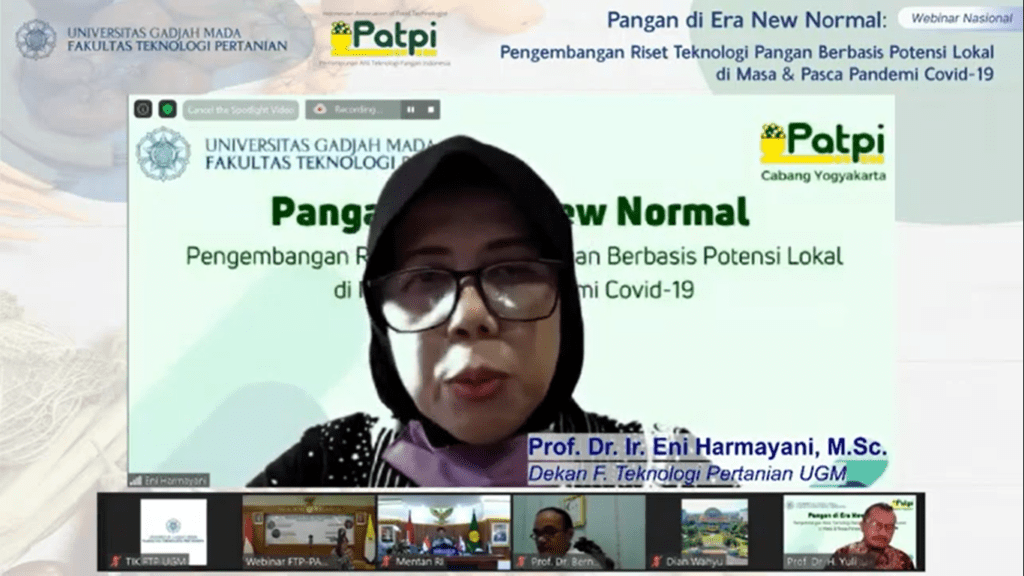
She explained about the objectives of this webinar, including:
- Describe the current state of the national food security policy
- Describe the challenges and prospects of developing local resource-based food technology
- Synergize ideas to improve the quality of healthy life through local food consumption patterns that are diverse, nutritious, balanced and safe
Building food research synergies in order to overcome the challenges during pandemic or post-pandemic or future challenges

Next is the welcome speech from the Chairman of PATPI, Prof. Dr. Ir. Umar Santoso, M.Sc.
At the beginning of the early pandemic situation, around early of March, PATPI provided suggestions, which was summarized in 6 points.
Out of the 6 points of suggestions, two of which are:
- Inviting all members and Indonesian food technologists to play an active role based on their competence in their respective environments by educating the public in accordance with scientific principles that are both true and valid, PATPI members are encouraged to be more productive and innovative in developing their relevant studies and researches and to create a real impact on the community’s needs for health and on the community’s economy.
- Propose to the government, in particular to the Ministry of Research/ BRIN, the Ministry of Health to contribute greater attention to the development and research in the field of food and health that will enable food production and ingredient independence, as much as possible by utilizing the potential of Indonesia’s resources.
The objective is to have a policy formulation that enables the development of local resource-based food technology research that is applicable and of great benefit to the community.
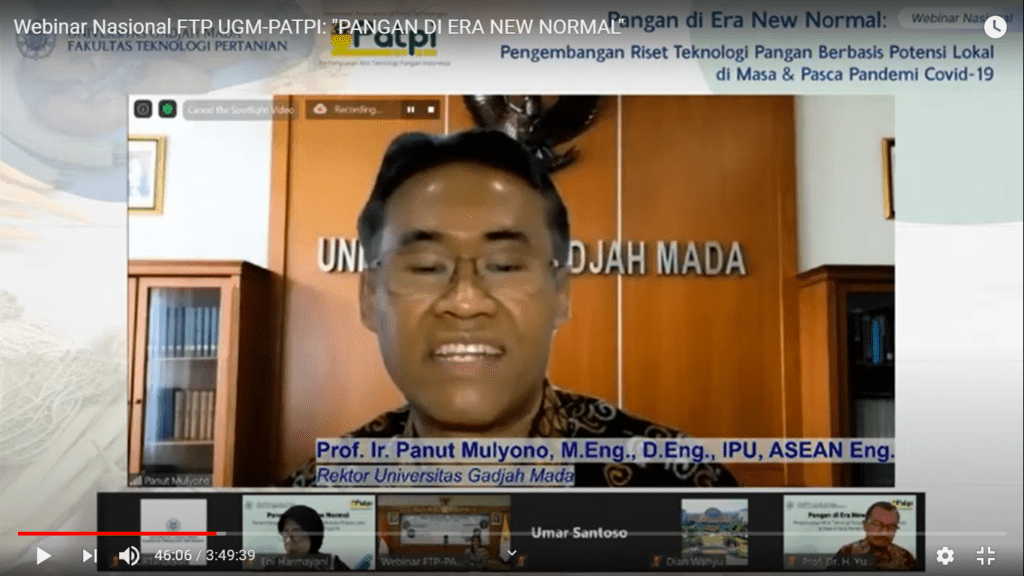
Next is the welcome speech and webinar opening by the Rector of Gadjah Mada University, Prof. Ir. Panut Mulyono, M.Eng., IPU,ASEAN Eng.
He congratulated FTP UGM, Central PATPI and PATPI Yogyakarta branch that have held this webinar. This pandemic of course, has created an extensive impact on the activities of nations around the world, including Indonesia, if not handled swiftly and appropriately, it will cause a social disaster in the community. However, this incident also created a positive impact, we are all becoming more synergistic to build the nation. Import dependence behaviour and globalization have an increasing trend to enter Indonesia, including food products. This is a challenge for all of us, where large natural resources are available. Therefore, research must be strengthened in order to encourage leverage, to suppress the flow of imports of various food needs and to build good cooperation between the government, academia, industry and society.
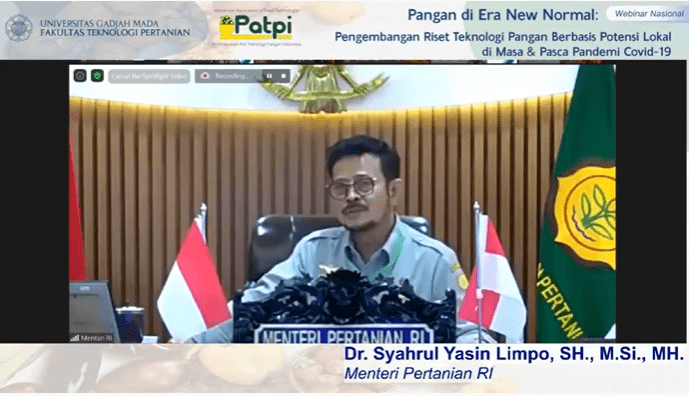

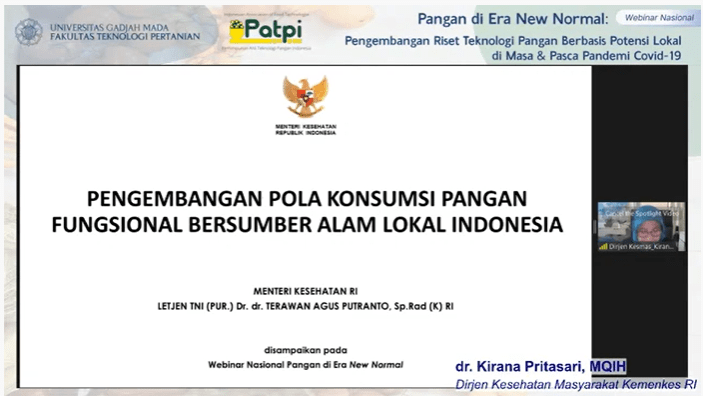
The first material was presented by the Minister of Agriculture, Dr. Syahrul Yasin Limpo, SH., M.Si., MH. He discussed the development of swamp area and the expansion of new land areas in Kalimantan.
Furthermore, the material was presented by a representative from the Ministry of Health with the title Development of Functional Food Consumption Patterns from Local Indonesian Natural Sources, dr. Kirana Pritasari, MQIH (Directorate General of Public Health, Ministry of Health of the Republic of Indonesia. Representing LETJEN TNI (PUR.) Dr. dr. TERAWAN AGUS PUTRANTO, Sp. Rad (K) RI.
From the nutritional condition description in Indonesia, the nutritional status in Indonesia has improved, the proportion of stunting under five years old in Indonesia based on basic health research is 30.8%, the number of children under five years old is around 22 million in 2013, has decreased to 27.67%. However, it still exceeds the threshold set by WHO, so that Indonesia’s condition still faces issues such as an increase of the prevalence of excess nutrition/obesity as well as micronutrient deficiencies as shown, and in reducing anaemia in pregnant women and anaemia in adolescents.
Good functional food should become a daily consumption pattern, especially local-based ones, it will improve nutritional and health functions and reduces the risk of disease. However, it must be based on scientific evidence and studies, and it must be able to provide appropriate information regarding the benefits of functional foods that provide physiological support to improve health.
Indonesia has a wide variety and types of food, local food has great potential to become a source of functional food. Identification, support for scientific studies, accurate information on benefits, contribute to improving nutritional status. Researchers and academics play a significant role, and it is expected that a cooperation is formed between the government, researchers and academics who support each other. The benefits of bioactive components include the content of unsaturated fatty acids in fish that can reduce the risk of disease, immune-competence can improve immune function, gingeral in ginger can reduce inflammation, the polyphenol content in coffee as an antioxidant is expected to act as a free radical scavenger. One of Indonesia’s fermented foods, fish peda, is rich in unsaturated fatty acids that can increase antibodies. The recommendation from the Ministry of Health regarding the situation and condition of this Pandemic is to ensure that daily consumption is varied and nutritionally balanced which is visualized by the contents of one’s plate; Functional food plays a role to provide healthy and nutritious food; Indonesia has great potential for the development of functional food; it is necessary to develop scientific studies of local Indonesian food to be claimed as functional food, it is necessary to provide information on the content and benefits of appropriate functional food to the public.
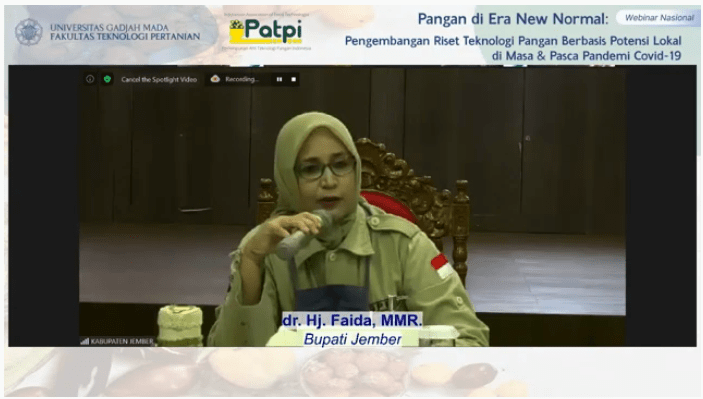

Furthermore, the third material is presented by Dr. Ir. Bambang Setiadi, IPU (Chairman of the National Research Council). He stated that we should observe Japan, there are many of their traditional products that are widely known and famous in other countries in the world. This is due to the formation of an ‘image’ of traditional food that is not less prestigious and the promotion of love for traditional food.
One of the Indonesian products that was assigned was Tempe. Tempe producers in the world are controlled by Japan. However, Tempe production needs to be standardized. Besides Tempe, there is also honey. Honey should be the local potential of Indonesia. The following conclusions are presented by him:
- Local food innovation is significantly necessary to strengthen competition
- Manufacturers need to proactively take initiative to use advance technology
- Calculate the existing business facts
- Innovation must improve local food so that it can boost up the community’s confidence
- Love for local food must be nurtured since early age
The fourth material is presented by Prof. Dr.Ir. Eni Harmayani, M.Sc (The Dean of FTP UGM). Despite the pandemic, Indonesian local food is still imported. Can Indonesia provide ….. ****incomplete sentence****
The challenges in food and agricultural research at the moment among others are:
- Fulfil the need of food for food sovereignty
- Increase productivity and food production
- Reduce food imports
- Overcome nutritional problems, stunting, increase immunity during and after the Covid-19 pandemic
- Improve farmers welfare
- Increase the use of local food ingredients that have been widely known to the public, research has been carried out and are easily adopted by farmers and industrial actors
Problems and challenges for local food and food diversification among others are:
- Human health depends on the diversity of chronic nutritional sources, only a small number of plant species are used as food sources
- The low diversity of intake is caused by social aspects, poor public awareness, and the absence of a supply chain
- There are only 3 main types of agriculture that are utilized and they contribute 60% of the total food calories consumed
- Currently only 120 species are utilized and they contribute 90% of the total food calories consumed
- Food systems have become more uniform and lost their diversity
- This trend poses risks to production, distribution, and the ability to access food
- The increase of food prices causes riots and famine in many countries
Local food development strategies include:
- Promote small-scale production and storage process techniques;
- Development of post-harvest handling to maintain nutritional content as well as quantity and quality of local food;
- Development of small-scale agro-industry and support marketing for small farmers to increase income;
- Strengthen knowledge on local food and emphasize the importance of local food and healthy eating patterns.
Besides the speakers, this webinar is also supported by expert comments, who, among others are Prof. Sigit Supadmo Arif; Prof. Dr. Ir. Sri Raharjo, M.Sc; Prof. Dr. Yudi Pranoto, S.TP, MP; Prof. Dr. Yuli Witono, S.TP., MP.

Leave Comment